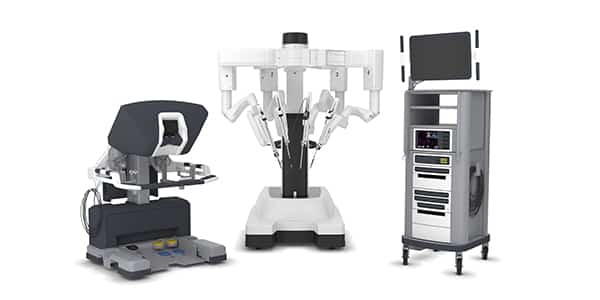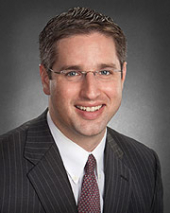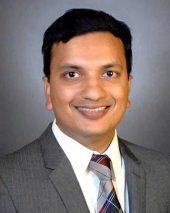- Otorhinolaryngology (ENT)
- Transoral Robotic Surgery TORS
Transoral Robotic Surgery (TORS)
Transoral Robotic Surgery (TORS)
TORS is an innovative, minimally invasive treatment option to remove head and neck cancers through the mouth.
TORS is an innovative, minimally invasive treatment option to remove head and neck cancers through the mouth.
Transoral Robotic Surgery Speeds Recovery for a Patient with HPV-Associated Tonsil Cancer
Transoral Robotic Surgery
Transoral Robotic Surgery (TORS) is a minimally invasive, robotic surgery technique that removes benign and malignant tumors of the mouth and throat. TORS uses the state-of-the-art da Vinci Surgical system which allows the surgeon to access areas of the throat that are difficult to reach with traditional surgery. The robot consists of a high definition 3-D camera attached to an endoscope for precise, magnified visualization and robotic arms equipped with small robotic instruments. The operating surgeon sits at a console and controls the robotic camera and arms, which exactly match the surgeons hand motions. An assistant surgeon stays at the patient’s bedside and assists the surgeon.
Dr. Kunal Jain, Otorhinolaryngologist, appears on Houston Life to explain how TORS is helping to improve outcomes for mouth and throat cancer patients.

Oropharyngeal Cancer
The oropharynx is the part of the throat just behind the mouth. It includes the back third of the tongue, the back part of the roof of the mouth, the tonsils and the side and back wall of the throat. Cancer starts when cells in the body begin to grow out of control. Cells in nearly any part of the body can become cancer and can spread to other areas of the body. Oropharyngeal cancer starts in the oropharynx. Symptoms of oropharyngeal cancer include:
- Trouble swallowing or pain on swallowing
- Changes in your voice
- Lumps in your neck
- Weight loss or decreased appetite with the above symptoms
Some patients do not have any symptoms until they get a lump in their neck which is also painless. We encourage any patient who has these symptoms to seek advice from their primary care physician, who can determine if a consult with a head and neck surgery is necessary.
Benefits of TORS
Trans Oral Robotic Surgery (TORS) is now the preferred treatment for many patients with oropharyngeal cancer. The benefits of TORS include:
- Shorter hospital stays
- less risk of infection
- quicker return to normal activity
- Reduced risk of long-term swallowing problems
- Less scarring compared to open surgery
- No routine use of tracheostomy

Ron Karni, MD serves as Chief of UTP Otorhinolaryngology’s Division of Head and Neck Surgery He graduated from Baylor College of Medicine and then completed his residency training at Washington University in St. Louis. Dr. Karni has authored publications on the novel treatment of occult primary oropharyngeal cancer (the unknown primary) and practical tools to integrate evidence-based methods into the daily practice of medicine. His current research focus includes de-escalation treatment strategies for throat cancer, morphoproteomic analysis of head and neck cancer, and HPV-related malignancies of the head and neck. Dr. Karni’s practice focuses on the management of benign and malignant tumors of the head and neck, including throat cancer, oral cancer, larynx cancer, locally advanced skin cancer, salivary gland tumors, and thyroid/parathyroid disease.
Houston, TX 77030-1539
(713) 486-5000
Kunal Jain received his medical degree at the University of Texas Southwestern Medical Center. He completed his residency in otolaryngology-head and neck surgery at SUNY Upstate Medical University in Syracuse, NY. He joined UT Physicians after completing a fellowship in head and neck oncology and reconstruction at the University of Pennsylvania in Philadelphia. Dr. Jain has coauthored articles published in Head and Neck, The Laryngoscope, Cancer, and Thyroid and other peer-reviewed journals. His clinical interests include treating patients with head and neck and thyroid cancer and advanced reconstruction and rehabilitation. His research interests include transoral robotic surgery for the oropharynx, and improving outcomes of head and neck surgery procedures.
Houston, TX 77030-1539
(713) 486-5000
More Info
Depending on the cancer’s stage, treatment options include surgery, radiation therapy and chemotherapy. For many patients, Transoral robotic surgery (TORS) can reduce the side effects of traditional surgery. At UT Physicians Otorhinolaryngology, each patient is evaluated by a multi-disciplinary team that includes a head and neck surgeon, medical oncologist and radiation oncologist. This team will make unique recommendations for each patient. During and after treatment, the patient will also meet a rehabilitation doctor, a physical therapist and a speech therapist. After treatment, patients are enrolled in a survivorship clink, which provides holistic care while performing surveillance for recurrence of cancer.
Anyone can get these throat cancers. Patients who smoke are at a higher risk for throat cancer. There has also been an increase in the number of throat cancers in non-smoking patients and this is believed to be due to the human papillomavirus (HPV). The number of throat cancers is set to surpass the number of cervical cancers soon and the Centers for Disease Control (CDC) has recommended that both girls and boys should receive the HPV vaccine.
The physician will ask you about your symptoms and perform a thorough head and neck exam. They will also perform a fiberoptic laryngoscopy (a simple in-office procedure that uses a small camera to look at the back your throat). If the physician suspects a tumor, he or she will order a CT scan and/or perform a biopsy.
Unfortunately, there is no current screening test for these cancers. While there have been attempts to create a screening tool such as an oral pap smear, it has not been found to be effective. There is ongoing research to create tools for screening. If you have any of the above symptoms and you are concerned, we recommend getting evaluated by a head and neck surgeon.




